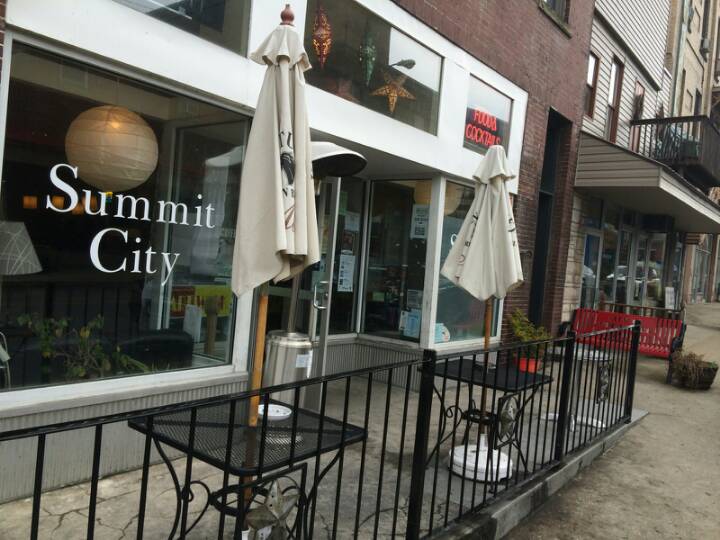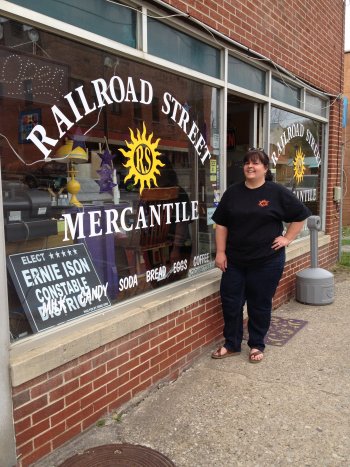One thing Amelia Kirby and David Fisher both knew when they opened businesses in downtown Whitesburg was that they wouldn’t get rich. They knew it was about something larger.
I. Summit City
When Kirby and her partner, Joel Beverly, opened Summit City Lounge in 2007, they had a feeling they were launching something that would be important for Whitesburg. But they had no clear game plan other than “a belief in having a space that whatever needed to happen in the town could happen.”
The town of about 2,000 in southeastern Kentucky lacked a “community convivial space” such as a bar or pub where cross-pollination of ideas and culture could occur.
“That is a really, really significant and underestimated piece of how community building happens in a lot of places,” said Kirby. “It puts people who would not necessarily be sitting together together in a space with usually the intent of finding some common ground.”
Buildings in downtown Whitesburg were cheap and easy to come by because so many were sitting empty. Beverly bought an old store building to use as office space for his environmental consulting business, Apogee Environmental and Archaeological.
 As they peeled back layers of dropped ceiling, paneling and carpet, “it just suddenly started to reveal itself as this really lovely space,” Kirby said.
As they peeled back layers of dropped ceiling, paneling and carpet, “it just suddenly started to reveal itself as this really lovely space,” Kirby said.
The wheels started to turn.
“We sort of started thinking about ‘What kind of things could this space be?’ and that led to ‘What do we wish we had in this town that we always leave for?’” Kirby said.
Aside from a community convivial space, they wanted really good food.
Talk of legalizing alcohol sales was floating around Whitesburg at the time, and they designed the space and built the business plan with the hope that Summit City could serve food and drinks. The town eventually did go wet, and Summit City became an example of what was possible for downtown Whitesburg.
At a time when the coal industry was declining and the divisive rhetoric was heating up, Kirby and Beverly thought a lot about what Summit City’s relationship to the coal dialogue would be. They made a conscious decision not to take a public position.
“It was really important to have a space that didn’t have parameters defined by us,” Kirby said.
Their clientele, as it turned out, was all over the political spectrum.
Summit City’s first success was keeping its doors open. Then came the music.
With Appalshop’s eclectic radio station, WMMT, in town, Summit City was able to build on a foundation of listeners who were looking for something outside the mainstream.
“Our music program has been one of the defining things about Summit City that really sets us apart,” Kirby said.
Before the lounge got a liquor license, Summit hosted a concert by Jason Isbell (formerly of Drive-By Truckers) to a stone-cold-sober packed house that was “silent raptness,” Kirby said. Word got around among artists that Summit City was an interesting place to play.
Open mic night has also been a hit. The weekly Wednesday event is a “truly sort of anchoring piece of all the work at Summit City in a lot of ways,” Kirby said. “I think that that’s been a piece that from the very beginning emerged organically. We had no particular intention around it.”
Kirby also likes the ceiling at Summit City, painted Maker’s Mark red.
“There’s some sort of element of warmth, trying to convey warmth and welcome, that’s been kind of a core value,” she said.
A brush with Alcoholic Beverage Control in 201l, when someone filed a complaint about the percentage of alcohol sales versus food sales, led to Summit City announcing it would close its doors. An unexpected groundswell of support, largely from people Kirby didn’t even know, showed just how much the community valued Summit City.
“We announced it, and immediately this huge robust resistance movement emerged,” Kirby said.
With the city’s support, Summit City was given a second chance by the ABC and was able to stay open with the understanding that the city would ask for a change in the regulation.
II. Railroad Street Mercantile
 Just around the corner from Summit City is the Railroad Street Mercantile, inspired at least partially by Kirby and Beverly’s example at Summit City.
Just around the corner from Summit City is the Railroad Street Mercantile, inspired at least partially by Kirby and Beverly’s example at Summit City.
“To me, they are a shining example of, ‘Hey, I am going to do this. Maybe I’m not going to make a fortune at it, but I’m going to do this. This is something we need,’” said David Fisher, who opened the mercantile with his wife, Kae, in October 2013.
The Fishers, lifelong residents of Letcher County, opened the store because they wanted folks in Whitesburg to have another option besides Walmart and Food City.
For most of his career, Fisher was “dyed-in-the-wool union.” He worked out of a Steelworkers local in West Virginia doing heavy highway construction and was a proud union member until he began to feel that the corporate emphasis had shifted from the workers to the bottom line.
He left the Steelworkers to work in the oil fields for a while and really saw the difference between the upper class and the middle class – in both income and core values. He also became concerned that large corporations, especially Big Ag, were controlling politics and making it harder for ordinary people to have a voice.
“Once I really did see the disconnect, that’s what really got me interested in doing something about it,” Fisher said.
He decided to take his experience and knowledge of farming and do something with it. As a kid, he’d spent summers working in his grandparents’ garden. When other kids were swimming or riding bikes, he was working.
“Now that I look back on it, I see why,” Fisher said. “My grandfather gave me something that you can’t buy: a strong work ethic.”
Fisher started out farming for himself and his family. Through a program called Grow Appalachia, which provides materials for families who want to grow their own food, he had access to a tiller and fertilizer. Before long, he was working part-time for Grow Appalachia, running the tiller and taking fertilizer to other farmers trying to get started.
And he began talking with others who were interested in starting a farmers’ market.
“Once I got involved in the farmers’ market I had access to four acres of ground that I tended,” Fisher said.
But he knew he couldn’t make it selling produce one day a week. So he started supplying local restaurants. He’d harvest on Monday and sell throughout the week. And he got certified to micro-process his harvest. With 150 tomato plants and 90 cucumber plants, “I knew I was going to have a lot of excess produce and I didn’t want to just throw it away.”
At the time, Kae Fisher worked at Summit City, and she’d often hear people ask where they could buy a bag of chips or bottle of aspirin. It was Kae’s vision that led the couple to open the Railroad Street Mercantile, which sells various necessities, as well as local produce, eggs and meat, and local art.
With hard work, help from others and scavenging for materials, the Fishers were able to open the store without going into debt. They think of it as a go-between: not a replacement for the chain stores but a place to buy a few things between trips to the bigger stores.
III. Symbiosis
Summit City Lounge, the Railroad Street Mercantile and a handful of other businesses in Whitesburg have worked cooperatively to provide for community needs, breathe new life into a dying downtown, and inspire other entrepreneurs.
“Thank you, my friend,” says David Fisher to a customer who comes into the store to buy an ice cream. It’s not just an expression. He knows everyone who comes through the door. He even has a chair sitting beside the door so folks can stay and visit.
“What I want to get away from and what I want to try to enlighten other people to is that the bottom line is not the do-all and say-all,” he said. “It’s not about my profit margin. It’s not about how much money I make this year. It’s not about what’s in it for me. That’s what we’re really trying to get away from.”
Kirby and Beverly were motivated to provide an important community space. The Fishers were motivated to provide local food and a local store. Both couples understand that a large part of their contribution is providing an example of what can be done.
Said David Fisher: “All these empty buildings – it’s opportunity. There’s not a lot of money here, don’t get me wrong. You come to Whitesburg and open a business, you’re not going to get rich. … But that’s the point we’re trying to make. We don’t want to get rich. If we can keep the lights on and keep stuff on the shelves and make it a viable option, an alternative to what we’ve got now, then yeah, we’re going to do all we can.”
Both Kirby and Beverly have other jobs besides Summit City. They keep the business open not because it’s profitable for them personally but because the community needs it.
Partly by default and partly by intention, Summit City has been a woman-centric business, as well as a launching pad of self-actualization for several women who have worked there, including Kae Fisher.
It has also provided a social space for young people. “For sure, Summit City has been a way that younger people both from here and not from here have found Whitesburg possible to stay here longer,” said Kirby.
One way in which these businesses support each other is by discussing what they will sell. If one business wants to serve Ale 8 or a particular type of wine, the others agree not to.
As eastern Kentucky’s economy transitions and the region finds a new identity, there are no guarantees for businesses like Summit City and Railroad Street Mercantile. Many coal jobs have been lost, and the population is declining.
But Amelia Kirby and David Fisher believe in what they’re doing. They want to stay in Whitesburg and build a thriving community.
“You’ve got to start with baby steps,” Fisher said.





